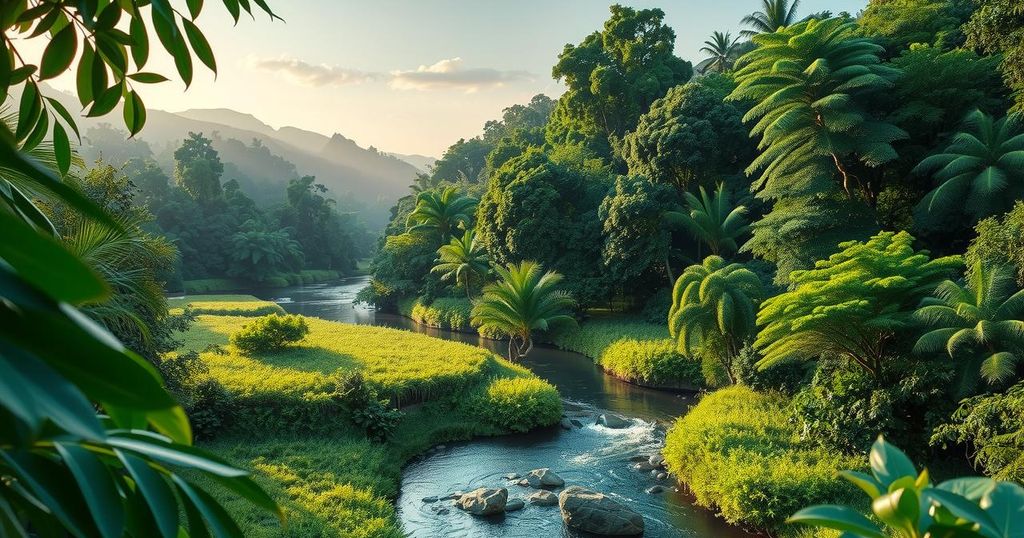Ecuador’s Presidential Election: Environmental Stakes and Political Priorities

Ecuador’s upcoming presidential elections on February 9 feature incumbent Daniel Noboa and challenger Luisa González, both promising environmental protections despite prioritizing economic growth, especially in oil and mining. Noboa’s plan includes significant investment in fossil fuels, raising concerns for climate goals, while González emphasizes clean energy and Indigenous rights. Ultimately, the election could shape Ecuador’s environmental legislation amid pressing climate change challenges.
Ecuador is set to hold presidential elections on February 9, with incumbent Daniel Noboa, a center-right candidate, running against left-wing challenger Luisa González. While both have directed their attention towards security and economic issues, they have made certain pledges regarding environmental protection, particularly in safeguarding forests and Indigenous communities. However, their plans to attract foreign investment in sectors such as mining and oil risk ongoing threats to Ecuador’s sensitive ecosystems.
During the last election in 2023, political instability led to snap elections following the dissolution of the National Assembly and a corruption scandal involving the then-President Guillermo Lasso. Noboa, elected at the young age of 35, faced the challenge of addressing rising gang violence and energy shortages amid a reliance on oil and gas. His administration has been criticized for human rights abuses and heavy-handed law enforcement, yet he remains the favored candidate for the upcoming vote.
Alongside the presidential election, Ecuador will also elect all 151 members of the National Assembly. Environmental issues have not been a primary focus for either candidate, as the electorate is more concerned with crime and the economy. Nevertheless, the candidates’ policies concerning mining, oil, and agriculture may significantly affect the country’s conservation goals over the next four years.
Noboa claims to acknowledge climate change and has proposed initiatives aimed at promoting sustainable development, reducing greenhouse gas emissions, and enhancing community resilience against extreme weather. Paradoxically, his administration also intends to invest $42 billion into the oil and gas sectors by 2029, raising concerns that economic interests are being prioritized over environmental sustainability.
The impacts of climate change are evident in Ecuador, with last year’s drought significantly affecting the country’s hydroelectric power production. This energy deficit necessitated widespread blackouts that extended well beyond initial forecasts, adversely affecting businesses and the populace. For his second term, Noboa has suggested implementing rainwater harvesting and storage projects as part of his strategy to address these challenges.
Noboa’s critics argue that economic concerns are eclipsing the long-term consequences of continued oil and gas exploitation. In a recent referendum, the public rejected the proposal to resume drilling in an area that would jeopardize Indigenous territories. Nevertheless, Noboa expressed intentions to potentially override that decision in pursuit of the revenue it could have generated.
Indigenous communities have voiced their opposition to expanded resource extraction activities on their ancestral lands. Noboa has stated his commitment to combating pollution and deforestation while involving marginalized groups in decision-making. However, activists remain skeptical, especially given reports of increased violence and systematic human rights violations during his first term.
González, with the Citizen Revolution Movement, a political party associated with former President Rafael Correa, has taken a more vocal stance on climate issues than Noboa. She advocates for a shift to clean energy and seeks to eliminate environmental disparities affecting vulnerable populations. However, she acknowledges the role of responsible oil and gas extraction in Ecuador’s economy, complicating her environmental rhetoric.
González aims to enhance the existing climate adaptation plan and establish new policies addressing biodiversity and forests. She proposes creating a dedicated fund for biodiversity conservation and emphasizes the need to strengthen government institutions responsible for environmental management. Her plans also include reinstating staff positions cut from the Ministry of Environment and supporting updated conservation management programs.
To secure a victory on February 9, González must achieve an absolute majority or at least 40% of the vote with a 10% lead over Noboa. Should neither candidate meet this criterion, a runoff vote will take place in April. Observers expect that a second round may be necessary to determine the presidency, mirroring the previous election’s outcome.
The upcoming presidential election in Ecuador is set against a backdrop of environmental concerns amid a political climate focused on security and economic stability. Candidates Daniel Noboa and Luisa González have made various commitments regarding environmental protection, yet their plans for economic investment—particularly in oil and mining—pose significant risks to the country’s ecosystems. This election is critical, as it may determine Ecuador’s future approach to balancing economic growth with environmental preservation amidst the ongoing challenges posed by climate change.
In summary, Ecuador’s presidential election on February 9 presents a pivotal moment for the country’s environmental future. Both candidates have acknowledged environmental issues but are heavily focused on economic growth, which may jeopardize conservation efforts. With escalating climate change effects and significant socio-political instability, the elected leader’s policies will be vital in determining the trajectory of Ecuador’s environment, especially concerning the exploitation of natural resources and the rights of Indigenous communities.
Original Source: news.mongabay.com







